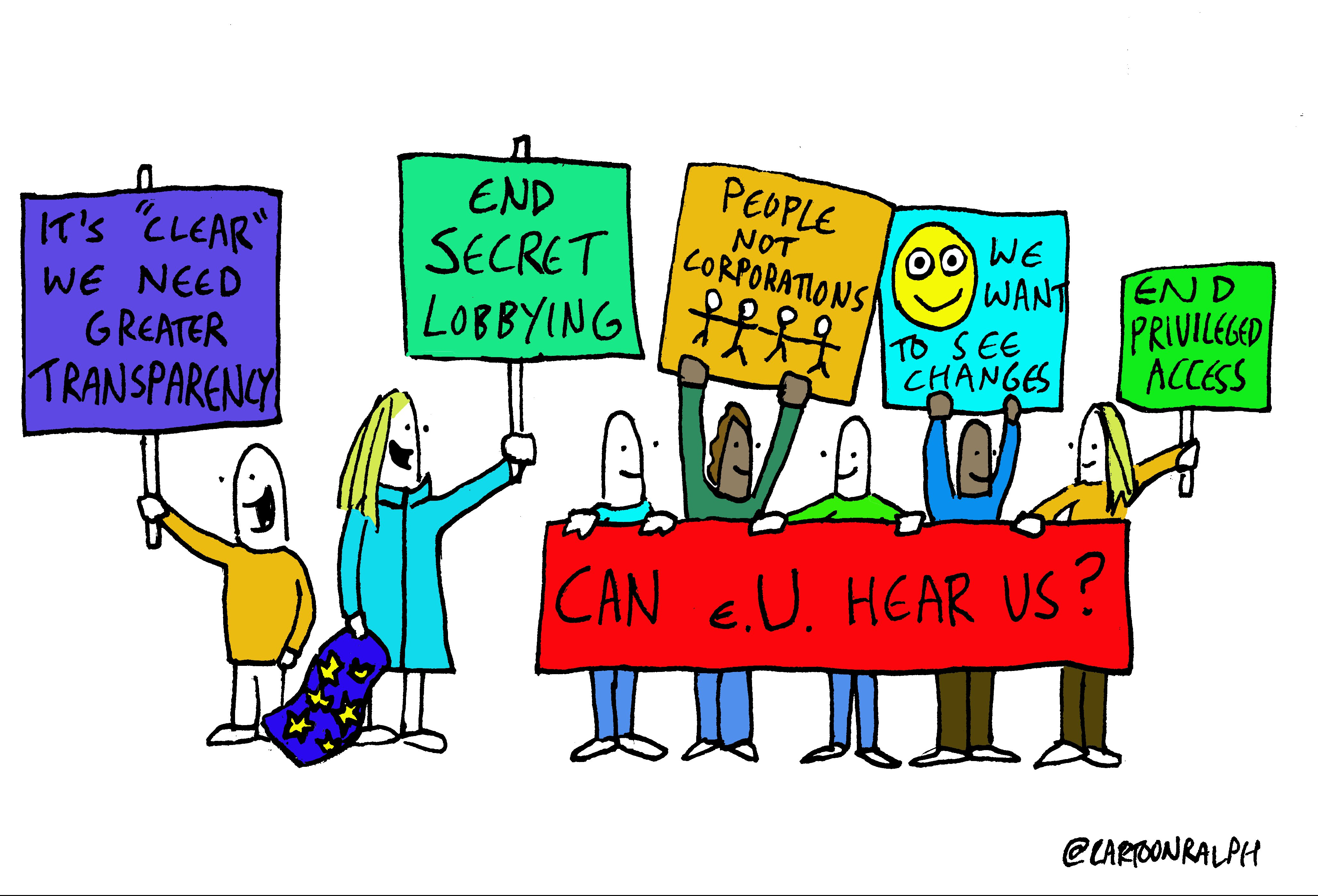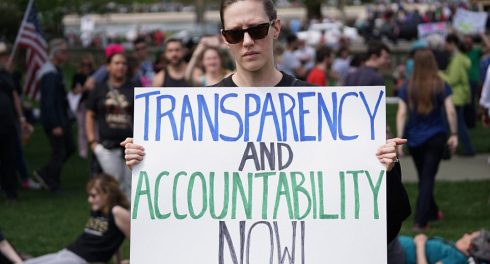Highlight
- No time to be shy
- With eyes elsewhere…
- Data: Govern me. Please
- Unrecognized prospects
- Collaboration – warts and all
- TAI Spotlight: Why TAI new strategy matters

Photo credit: @CartoonRalph via accessnow
No time to be shy
ONE co-founder Jamie Drummond worries about misinformation and a lack of oversight of government actions and spending to deal with the current crisis around the globe. His recommended antidote? Openness – specifically open budget, open response and open recovery. As Michael Igoe reports, this principle needs to extend to donors. Yes, get money out fast, but do so with transparency. The World Bank alone plans to spend $160 billion over the next 15 months, so as Open Contracting Partnership’s Gavin Hayman urges, “keep the receipts, accurately tag the ones that involved emergency procurement processes for COVID-19, and make the information publicly available.”
How are governments going to repay donor lending and restore their balance sheets? It’s a far off prospect, but taxes will be an important instrument. With that in mind, Wilson Prichard and Mick Moore ask a vital question: how should we tax after COVID? They urge revenue strategies must respect the fact that the poorest 50% of households not be expected to pay, much of the additional burden should fall on wealth and that tax plans should be geared to addressing major societal problems. Hard to argue with that. Let’s hope considering the next phase of the Addis Tax Initiative around revenue mobilization are listening. Meantime, tax administrations, might want to check out a new OECD brief on restoration planning to restore taxpayers to economic recovery.
Meanwhile, as the noose tightens around state aid to tax haven–linked businesses, Tax Justice Network wonders why Lufthansa is reluctant to accept a $9billion state bailout due to a requirement to reveal its profits across markets of operation. What has the airline to hide?
Sticking with things people might want to hide, Anna-Maija Mertens, Timo Lange, and Michael Peters offer insights on what a fair and transparent lobbying system looks like while another OECD brief suggests policy measures to put in place to avoid corruption during the upcoming recovery. Perhaps policymakers might want to read a new book by John Cassara examined old and new money laundering methodologies, exposing threats, enablers, and facilitators of illicit financial flows.
Looking to a longer term solution, Carissa Munro and Monica Kirya call for the institutionalization of integrity education in school curricula. They are asking donors supporting human rights and citizenship education in schools to embrace this as an important part of global anticorruption work.
With eyes elsewhere…

In a reminder of the need to not let all things COVID-related divert attention from what might be happening in plainish sight, a new United States Institute of Peace report suggests that Chinese business networks with links to organized crime are doing just that – signing new agreements with armed groups in Myanmar to establish an “unauthorized special economic zones” with up to $36 billion in investment during this pandemic crisis.
Hoping to deter such murky dealing, Global Witness’ Richard Gardiner questions European Commissioner for Justice, Didier Reynders, as Reynder commits to introduce legislation that will hold business to account for their human rights and environmental impacts as part of the Commission’s 2021 work plan and the European Green Deal.
Picking up on the environmental angle, new research from the Responsible Mining Foundation shows large-scale mining companies are less likely to track and report on their management of water quality compared to water quantity. They outline the importance of tracking water quality as a public interest issue and suggest ways that mining companies can do more.
What of developing countries who rely on fossil fuel exports? Peter Nagle considers the prospects for a price recovery for coal and natural gas while Mark Robinson of EITI suggests 3 ways that transparency can help countries navigate overlapping crises and Suneeta Kaimal affirms the importance of resource governance amid what could be an accelerated energy transition. Squeezed public coffers might mean governments have to review their commitment to fossil fuel subsidies. In a potential early sign of that the Liberia Electricity Regulatory Commission has begun a cost of service study, with the goal of moving toward “cost-reflective energy prices”, and ensuring the availability of data for regulatory reviews of tariff proposals.
Fossil fuels are hopefully not on the list of prospects for the impact investing community report, but what could be amid coronavirus-related shocks? Adva Saldinger takes a look at the industry’s response so far and how it could change.
Data: Govern me. Please

Image via: acessnow
Data collection efforts in response to the pandemic are exacerbating concerns of experts, such as Cristina Goni, focused on a legal gap between data protection and privacy. It will be interesting to gauge reactions to recommendations from the OECD on the essential framework that governments should adopt about data governance and privacy.
For their part, Andrew J. Zahuranec and Stefaan G. Verhulst advocate for new and innovative governance approaches in the use of data for COVID-19 and Reema Patel argues that “getting the right data infrastructure in place has a central role to play in addressing ethical and human rights concerns around the use of data.” Andrej Zwitter and Oskar J. Gstrein also offer lessons from humanitarian expertise in data protection and data responsibility in times of crisis.
Concerns over data governance are also prominent in the initial concept note for the World Bank’s World Development Report 2021 on Data for Better Lives. The team are conducting consultations over the summer – make your voice heard!
How can communities identify and evaluate automated decision-making and surveillance technology? The American Civil Liberties Union and Tech Fairness Coalition have developed a toolkit for that, using a flowchart, prompts, and questionnaires to help people ask “critical questions about technology oversight to [their] local representatives, lawmakers, and government officials.” They’ve even documented the process of co-designing the tool with community advocates. In complementary mode, Barbara Pase shares early learnings from Engine Room ongoing research project on how civil society can build a more equitable tech and human rights ecosystem.
In non-COVID related circumstance, Fiona Scott Morton and David Dinielli lay out a roadmap to bring an online advertising monopolization case against Google, alleging it “built an ‘ad tech stack’ with components that created a search engine marketing monopoly to keep out competitors and force media buyers and sellers to use its services.” This likely signals a more concerted effort to take on antitrust battles by Omidyar Network (part of the Omidyar Group along with TAI member Luminate).
Essential Watch: Adaptive leadership in the Covid-19 response: navigating crisis and change
A panel featuring researcher, administrator and political advisor perspectives digs into practical applications of adaptive responses during the Covid-19 outbreak, bridging science, policy and practice.
Unrecognized prospects
Building on their COVID-19 tracker, the Centre for Law and Democracy examines how States are limiting Right to information (RTI) due to COVID-19 and makes a recommendation on protecting and maintaining RTI amid health emergencies.
There has been no shortage of attention this past week on Taiwan and China’s growing pressure, but Tatevik Hayrapetyan considers the post-pandemic prospects for an even more unrecognized territory – Nagorno-Karabakh. Can this crisis lead it to be more inclusive and democratic? It will be harder unless the international community can develop new and flexible tools to work in unrecognized areas.
Tatevik is unlikely to find much inspiration elsewhere right now. Yes, hundreds gathered in Minsk, Belarus to protest against the rule of President Alexander Lukashenko, who is seeking his sixth term in office in August 9 elections, but divisions in the US become ever starker ahead of a November election, the results of Burundi’s election are in a heated dispute. In the shadow of the coronavirus, Sandra Weiss worries democratic principles are thrown overboard in Latin America as authoritarian tendencies spread quickly, and last week’s webinar of academic experts emphasized a rise of authoritarianism around the globe.
Can popular mobilization and engagement stem the tide or offer new opportunities? Mathilde Bouyé suggest we may take a lesson from the French Citizens’ Convention on Climate Change as to how citizens can contribute to sustainable recovery. London School of Economics graduate students highlights how informal social protection measures within communities are proving even more essential to help people survive the fallout of lockdowns, and suggest ways funders can provide support. You can also check out the inspiring work done by the groups featured in the online grants database of the Global Fund for Community Foundations. (It lets you see grants made by year, programmatic focus, and place.) For its part, the International Civil Society Center shares a list of resources for civil society to remain resilient in the COVID-19 pandemic.
Collaboration – warts and all

As a funder collaborative, getting to more than the sum of our parts is our core business. We are excited to publish a new set of our collaboration case notes this month. They feature different types of collaboration of varying degrees of success – the focus is on learning. Hopefully, these will be of interest to the likes of Heather McLeod Grant and Kate Wilkinson of Open Impact and Mickey Butts of Insight Content Lab, who advocate for more collaboration among funders and shares how to do it well. Good to pair with this reminder from David Ehrlichman, David Sawyer and Matthew Spence on how to make networking and collaboration work.
Finally, Rockefeller Foundation asks the research and evaluation community to adapt to the current reality by leveraging remote tools to measure the impact of Covid-19 on the world’s most vulnerable populations.
Essential Listening: Is everything that matters metric-able?
Ford Foundation President Darren Walker joins Abby Disney to discuss the role of modern philanthropy modern philanthropy: how it has evolved, how its success is measured, and who it benefits on both sides of the ledger. “If you are working on social justice…or working on the ideals of social change, you can never take for granted that progress will be permanent and therefore you must have institutions that are resilient, durable, and ready at the drop of the hat for whatever the challenge may be,” says Darren.
TAI Spotlight: Why TAI new strategy matters
Why TAI new strategy matters | Transparency and Accountability Initiative (TAI)
In the midst of a pandemic and economic crisis may not seem the most opportune moment to launch a new strategy but we have reasons to believe it is essential to making progress on current global challenges. TAI’s Executive Director, Michael Jarvis discuss changing shifts in the transparency, participation, and accountability field and how TAI’s new strategy can help.
How to hold government accountable during COVID-19 | Chandler Foundation
Chandler Foundation CEO, Tim Hanstad hosted a webinar on Governance, Funding & COVID-19 on the Catalyst 2030 –Catalysing Change campaign platform to discuss how to hold governments accountable now and in the future.
Darren Walker on The Quarantine Tapes podcast | Ford Foundation
Ford Foundation President, Darren Walker joins Paul Holdengräber on The Quarantine Tapes, a podcast series on the cultural impact of social distancing. They discussed collective interdependence, economic inequality, corporate responsibility, and how hope is crucial to our democracy.
Who owns your data? It’s complicated| Luminate
Watch Martin Tisné as he delves into the complicated world of digital rights with Thomson Reuters Foundation. Question to consider – Who owns your data? What is it worth? and How can you protect it?
Philanthropy, privilege, and racial Justice | MacArthur Foundation
As many parts of the world began to open up from COVID-19 lockdowns, and racism rose its ugly head, MacArthur staff and President John Palfrey reflect on and share responses to racist events, the systems that uphold it, and the Foundation’s commitment to bring about a more just, verdant, and peaceful world.
$500,000 investment to support COVID-19 response in Puerto Rico | The Open Society Foundations
The Open Society Foundations announced a $500,000 investment in Puerto Rico to support health care workers, workers excluded from government stimulus packages, access to legal aid, and advocacy efforts to ensure progressive economic solutions.
Job Listings
- Job postings at Ford Foundation – Ongoing
Job postings at Luminate – Ongoing
Job postings at Democracy fund – Ongoing - Government Affairs Senior Policy Advisor, International Financial Institutions at Oxfam – Ongoing
- Reset. Information control fellowship – July 1, 2020
- Reset. Resident fellowship – July 1, 2020
Calls/Opportunities
- BetterTogether Challenge for innovators – Ongoing
- Free Digital Security Training – Ongoing
Open Road Alliance Charitable Grant and Loan to organizations responding directly to COVID-19 – Ongoing - Call for submissions to SSIR Series: Social change in an era of extreme polarization – Last Thursday of every month until early 2021
- Pulitzer Center Coronavirus news collabortion challenge – Applications will be reviewed on a first-come, rolling basis
Call for proposals: Informality, tax, and the state – Proposals accepted on a rolling basis - Change Leaders in Philanthropy Fellowship – (application opens on June 2020)
- Proposal submission for the 2020 Summer Evaluation Institute – June 7-10, 2020
- Marielle Franco Award for feminist essays 2020 – June 16, 2020
- Open call for grants funding on social accountability and transparency in the national education sector – June 19, 2020
- Proposal: Working together to improve governance and anticorruption (Central and Eastern Europe focused) – June 30, 2020
- Reset our future fund for organizations and people using technology, research, and education that help tackle these challenges – July 1, 2020
- IBM call for Code Covid-19 Global Challenge – July 31, 2020
Amartya Sen essay contest 2020: Illicit financial flows – August 31, 2020
Calendar
Please double check the websites for these events to make sure they are still happening – many are subject to change due to the spread of coronavirus.
- Transparency International: 19th International Anti-Corruption Conference – (Postponed)
OpEx Africa: The spirit of collective action – June 1-4, 2020 (Online conference) - Civic Power in a Pandemic – June 2, 2020 (5pm – 6:30pm)
- Human Rights Litigation Summer School at Berlin, Germany – June 8-12, 2020
The future of finance and banking systems in Africa beyond Covid-19 — June 9, 2020 (14:00-15:30 BST) - Women and Girls Africa Summit – June 9-12, 2020 (Durban, South Africa)
RightsCon 2020 – June 9-12, 2020 (San Jose, Costa Rica)
COVID-19 in the Global South: Economic Impacts and Recovery— June 10, 2020 (9-10:15am PST) - 2020 Neighborhood Funders Group National Convening (philanthropy support to grassroots power building) – June 29 – July 1, 2020 (Washington, DC)
WE EMpower UN SDG Challenge 2020 – September 18 – 27, 2020 (New York City, United States of America)
The 2020 Journalism Funders Gathering (funder-only gathering) – October 6-7, 2020 (Philadelphia, United States of America)
Humanitarian and Development Data Forum – November 2-4, 2020 (Chambery, France)
International Open Data Conference –November 18-20, 2020 (Nairobi, Kenya).


